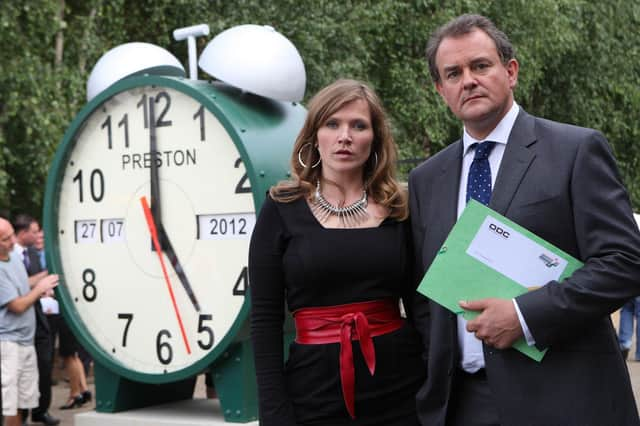BBC Four is needed more than ever during dark time for culture: Anthony Clavane


“All right,” says Reg, after being bombarded with a list of his oppressors’ greatest achievements, “apart from the sanitation, the medicine, education, wine, public order, irrigation, roads, the fresh-water system, and public health, what have the Romans ever done for us?”
Last week, a group of culture-loving campaigners objecting to a plan – revealed in several national newspapers – to axe the BBC’s highly-regarded arts channel, made a similarly Python-esque point.
Advertisement
Hide AdAdvertisement
Hide AdSomething along the lines of: “Apart from The Thick of It, Charlie Brooker’s Screenwipe, Twenty Twelve, Mad Men, The Killing, Only Connect, The Wire, Detectorists, Wallender and a host of award-winning art, history and music documentaries, what has BBC Four ever done for us?”
I was one of the 60,000-or-so people who signed a petition calling on the corporation to save BBC Four. I was outraged that a channel I adored was – to mix my John Cleese-isms – to be no more. That it would cease to be, would be bereft of life, was going to meet its maker.
A couple of days ago, there appeared to be a reprieve. In proposals submitted to Ofcom, BBC planners declared it wasn’t actually being closed down. Some campaigners hailed this “climbdown” as a victory.
The celebrations proved to be a bit previous. For, when the proposals were scrutinised more closely, it became clear it was being converted into an archive channel.
Advertisement
Hide AdAdvertisement
Hide AdIt was not an ex-channel, exactly. But it would no longer be the go-to-place for original, smart, edgy arts programmes.
At its launch 18 years ago, its slogan had been: “Everybody needs a place to think”. Nothing, surely, has changed.
Indeed, with theatre and art gallery closures, gig cancellations and a general slump in creative activities during the coronavirus pandemic, this is precisely the moment a free-to-air channel devoted to thought-provoking cultural shows is needed by the nation.
It is, as drama writer Flora Carr wrote in the Radio Times, “a lifeline for those who are currently staring at the same four walls day in, day out, and particularly for those self-isolating alone. For those stuck at home and looking for creative ways to fill their time, BBC Four has filled that gap.”
Advertisement
Hide AdAdvertisement
Hide AdSo, why was the Beeb even contemplating getting rid of it? Why are they busy transforming it into a vehicle for repeats?
Two reasons: cost and age.
The Covid-19 crisis has created a £125m hole in its funding. And – when it comes to budget cuts – live drama performances, documentaries about the Brontës and Bach concerts will always be deemed more dispensable than bland reality shows, terrible cross-dressing sitcoms and the enormous salaries of high-profile, high-earning presenters.
Television, of course, remains in thrall to youth. Like the rest of the industry, the BBC is obsessed with pursuing the 16-to-34-year-old demographic. The age of the average BBC Four viewer is 64.
According to its critics, the £44m spent on the network should be redirected to BBC Three, increasingly becoming the focus of the broadcaster’s desperate efforts to attract the country’s “yoof”.
Advertisement
Hide AdAdvertisement
Hide AdNow, it just so happens that I also like BBC Three. I have banged on about some of its wonderful offerings in this very column. I’m not sure why you can’t enjoy both channels.
As someone who is a lot closer in age to 64 than 34, I have fallen in love with supposedly-typical BBC Three dramas like Normal People, Fleabag and Killing Eve.
By the same token, why can’t a twentysomething hipster fall in love with Scandi dramas like The Killing, review shows like Kermode and Mayo’s Home Entertainment Service, performances by percussion soloists and series on surrealism?
True, the so-called highbrow channel has strayed, somewhat, from its original remit, showing too many dramas about mediocre comedians and Top of the Pops reruns.
Advertisement
Hide AdAdvertisement
Hide AdAnd yet it remains, for the time being at least, a feast for the senses.
It continues to fire my imagination. It quenches my thirst for knowledge. Above all, during these frightening times, it keeps me sane.
Editor’s note: first and foremost - and rarely have I written down these words with more sincerity - I hope this finds you well.
Almost certainly you are here because you value the quality and the integrity of the journalism produced by The Yorkshire Post’s journalists - almost all of which live alongside you in Yorkshire, spending the wages they earn with Yorkshire businesses - who last year took this title to the industry watchdog’s Most Trusted Newspaper in Britain accolade.
Advertisement
Hide AdAdvertisement
Hide AdAnd that is why I must make an urgent request of you: as advertising revenue declines, your support becomes evermore crucial to the maintenance of the journalistic standards expected of The Yorkshire Post. If you can, safely, please buy a paper or take up a subscription. We want to continue to make you proud of Yorkshire’s National Newspaper but we are going to need your help.
Postal subscription copies can be ordered by calling 0330 4030066 or by emailing [email protected]. Vouchers, to be exchanged at retail sales outlets - our newsagents need you, too - can be subscribed to by contacting subscriptions on 0330 1235950 or by visiting www.localsubsplus.co.uk where you should select The Yorkshire Post from the list of titles available.
If you want to help right now, download our tablet app from the App / Play Stores. Every contribution you make helps to provide this county with the best regional journalism in the country.
Sincerely. Thank you.
James Mitchinson
Editor
Comment Guidelines
National World encourages reader discussion on our stories. User feedback, insights and back-and-forth exchanges add a rich layer of context to reporting. Please review our Community Guidelines before commenting.